Some of Steam’s oldest user accounts are turning 20-years old this week, and Valve is celebrating the anniversary by handing out special digital badges featuring the original Steam colour scheme to the gaming veterans.
Steam first opened its figurative doors all the way back in September 2003, and has since grown into the largest digital PC gaming storefront in the world, which is actively used by tens of millions of players each day.
“In case anyone’s curious about the odd colours, that’s the colour scheme for the original Steam UI when it first launched,” commented Redditor Penndrachen, referring to the badge’s army green colour scheme, which prompted a mixed reaction from players who remembered the platform’s earliest days. “I joined in the first six months,” lamented Affectionate-Memory4. “I feel ancient rn.”



I don’t inherently disagree with what you’re saying, but online DRM would have happened anyway sooner or later, and online isn’t always online.
But most importantly, I’d rather a billion times have Valve rolling in that Steam money than any other publisher on the videogame market: the industry would be just that much worse, with unexisting indie devs and no Proton.
I mean… would it? Indie devs not only existed before Steam, but typically have a hugely contentions relationship with them. I haven’t forgotten all the growing pains about races to the bottom through sales, arguments about curation and the entire Greenlight fiasco.
I’d give them credit for pushing indie devs enough to get Nintendo to stop being annoying to work with, but that was Microsoft pushing Sony which in turn pushed Nintendo. Steam is background noise in that process.
Valve solved the issue of PC piracy in the way Netflix solved the issue of TV and movie piracy: by creating a convenient service people liked to use that is significantly more hassle free than digging through shady websites. If they hadn’t figured it out, the next-in-line big store that happened was GOG, which is coincidentally a DRM-free storefront that grew as a reaction to Steam. I don’t know what the CD Projekt Deck would have looked like, but we at least would have gotten a third sequel of a game series, so there’s that.